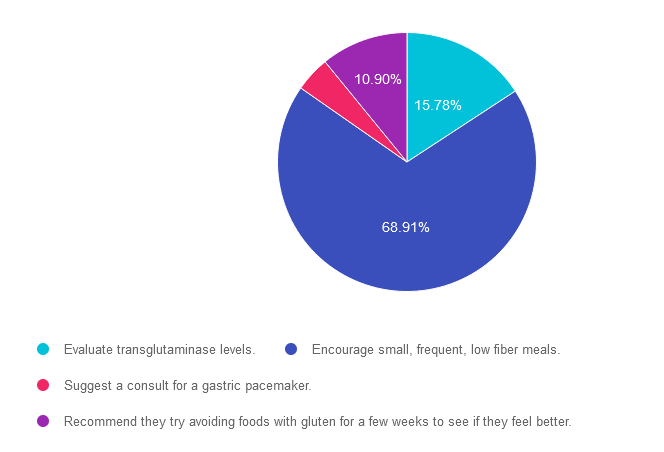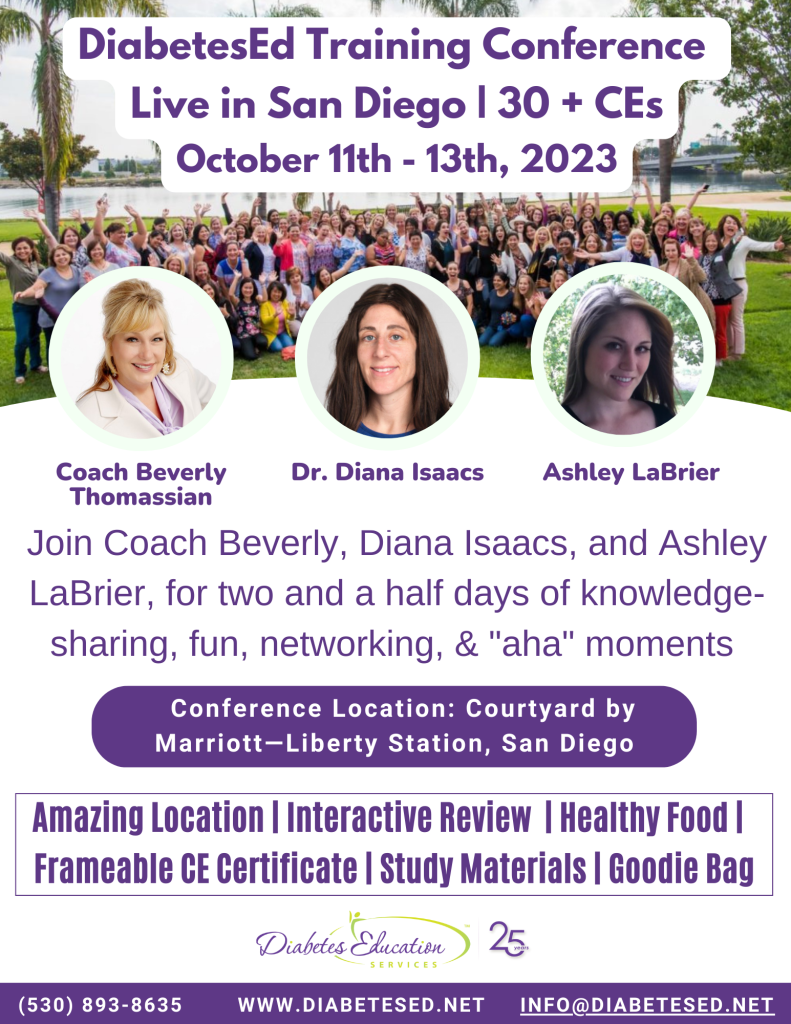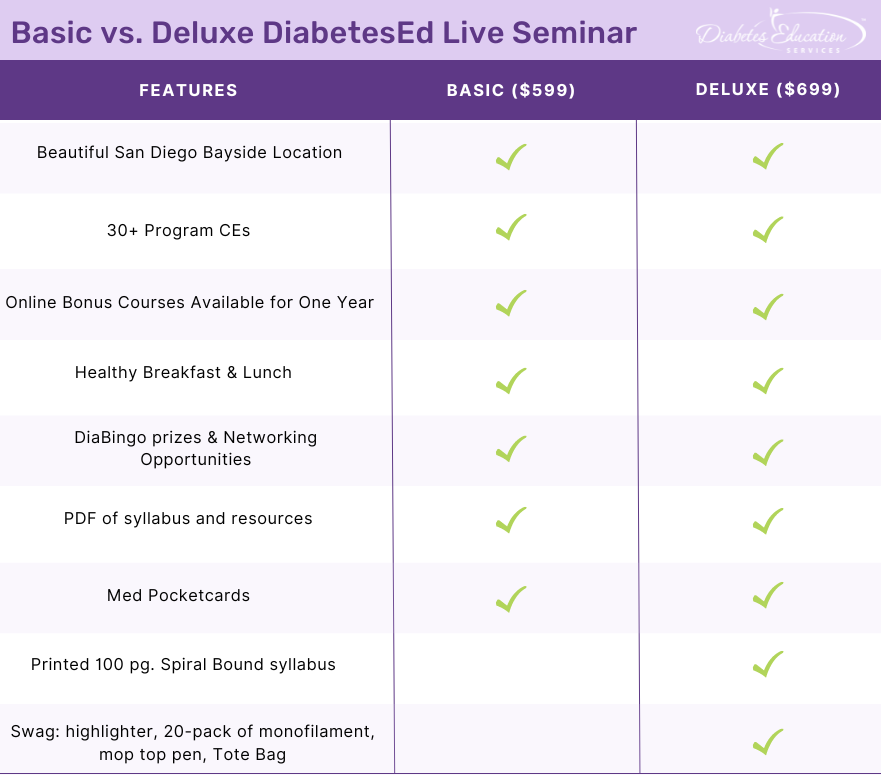
For last week’s practice question, we quizzed participants on post-meal hypoglycemia. 69% of respondents chose the best answer. We want to clarify and share this important information, so you can pass it on to people living with diabetes and your colleagues, plus prepare for exam success!
Before we start though, if you don’t want any spoilers and haven’t tried the question yet, you can answer it below: Answer Question
Question:
JR has lived with type 1 diabetes for over 30 years and has been complaining that they feel full and bloated after eating and experiencing more post-meal hypoglycemia.
Based on this information, what is the most appropriate recommendation for JR?
Answer Choices:
- Evaluate transglutaminase levels.
- Encourage small, frequent, low fiber meals.
- Suggest a consult for a gastric pacemaker.
- Recommend they try avoiding foods with gluten for a few weeks to see if they feel better.

Getting to the Best Answer
If you are thinking about taking the certification exam, this practice test question will set you up for success. Test writers anticipate possible answers based on the details in the question. They will wave those “juicy answers” right under your nose. Your job is to weed through the particulars, pluck out the most important elements and choose the BEST answer.
Answer 1 is incorrect. 15.78% chose this answer. “Evaluate transglutaminase levels.” Based on JR’s symptoms of “feeling full and bloated after eating and experiencing more post-meal hypoglycemia” we are not suspecting celiac disease since there is no mention of bloating after gluten rich foods. Plus, post meal hypoglycemia is more likely associated with the delayed gastric emptying associated with gastroparesis. Since transglutaminase is a test used to detect celiac disease, this is not the best answer.
Answer 2 is correct. 68.91% of you chose this answer. “Encourage small, frequent, low fiber meals.” YES. GREAT JOB! JR’s symptoms of “feeling full and bloated after eating and experiencing more post-meal hypoglycemia” are both classic symptoms of gastroparesis and delayed gastric emptying. This autonomic neuropathic condition is treated with glucose improvement and smaller, low fiber meals to support gastric movement. In addition, a referral to a GI specialist is certainly warranted.
Answer 3 is incorrect. About 4.41% of respondents chose this. “Suggest a consult for a gastric pacemaker.” JR’s symptoms of “feeling full and bloated after eating and experiencing more post-meal hypoglycemia” are both classic symptoms of gastroparesis and delayed gastric emptying. This autonomic neuropathic condition is treated with glucose improvement and smaller, low fiber meals to support gastric movement. However, before suggesting a consult for a gastric pacemaker, JR would first need a referral to a GI specialist to confirm diagnosis and evaluate best next steps.
Finally, Answer 4 is incorrect. 10.90% chose this answer. “Recommend they try avoiding foods with gluten for a few weeks to see if they feel better.” Based on JR’s symptoms of “feeling full and bloated after eating and experiencing more post-meal hypoglycemia” we are not suspecting celiac disease since there is no mention of bloating after gluten rich foods. Plus, post meal hypoglycemia is more likely associated with the delayed gastric emptying associated with gastroparesis.
We hope you appreciate this week’s rationale! Thank you so much for taking the time to answer our Question of the Week and participate in this fun learning activity!
Want to learn more about this practice question?
Join us LIVE in San Diego for our DiabetesEd Training Conference
October 11-13th, 2023

Two Registration Options

Join Coach Beverly and Team for two and a half days of knowledge-sharing, fun, networking, games with prizes, and “aha” moments in beautiful San Diego.
You don’t want to miss this one-of-a-kind learning opportunity. Get away from all those daily responsibilities and immerse yourself in a fun and intensive conference with plenty of networking opportunities.
Attendees will leave this conference with new tools and a more complete understanding of the latest advances in diabetes care, from medications to technology to Medical Nutrition Therapy!
Bring your colleagues and enjoy our friend discount.
Our team expertly translates the complex science of diabetes into understandable terms while keeping it real, practical, and fun.
Team of expert faculty includes:
- Diana Isaacs, PharmD, BCPS, BC-ADM, BCACP, CDCES – Educator of the Year, 2020
- Coach Beverly Thomassian, RN, MPH, CDCES, BC-ADM
- Ashley LaBrier, MS, RD, CDCES, Diabetes Program Coordinator
All hours earned count toward your CDCES Accreditation Information
Sign up for Diabetes Blog Bytes – we post one daily Blog Byte from Monday to Friday. And of course, Tuesday is our Question of the Week. It’s Informative and FREE! Sign up below!
The use of DES products does not guarantee the successful passage of the CDCES exam. CBDCE does not endorse any preparatory or review materials for the CDCES exam, except for those published by CBDCE.









